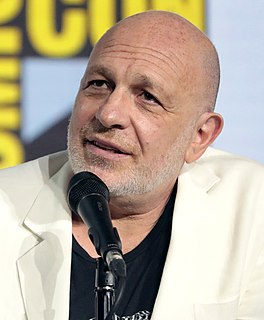A Quote by Jonathon Keats
I was interested first of all in trying to capture this myth that was always changing and to create some sort of a master story, some version of the myth that resonated with me, since I could have taken more or less any detail that I wanted or the opposite and try to put that down on the page in a way that I could express from that outset for myself and for our readers what it was that was so magical about [Buckminster] Fuller's way of putting together the world.
Related Quotes
Don't go changing to try and please me You never let me down before Don't imagine you're too familiar And I don't see you anymore I would not leave you in times of trouble We never could have come this far I took the good times, I'll take the bad times I'll take you just the way you are Don't go trying some new fashion Don't change the color of your hair. [...] I could not love you any better I love you just the way you are.
I think all writing is about writing. All writing is a way of going out and exploring the world, of examining the way we live, and therefore any words you put down on the page about life will, at some level, also be words about words. It's still amazing, though, how many poems can be read as being analogous to the act of writing a poem. "Go to hell, go into detail, go for the throat" is certainly about writing, but it's also hopefully about a way of living.
I compelled myself all through to write an exercise in verse, in a different form, every day of the year. I turned out my page every day, of some sort - I mean I didn't give a damn about the meaning, I just wanted to master the form - all the way from free verse, Walt Whitman, to the most elaborate of villanelles and ballad forms. Very good training. I've always told everybody who has ever come to me that I thought that was the first thing to do.
There is a place where the human enters dream and myth, and becomes a part of it, or maybe it is the other way around when the story grows from the body and spirit of humankind. In any case, we are a story, each of us, a bundle of stories, some as false as phantom islands but believed in nevertheless. Some might be true.
But the myth of power is, of course, a very powerful myth, and probably most people in this world more or less believe in it. It is a myth, which, if everybody believes in it, becomes to that extent self-validating. But it is still epistemological lunacy and leads inevitably to various sorts of disaster.
When I'm editing my work, I'm looking for everything to fit, to feel seamless, for every detail or line of dialogue or scene to feel necessary and organic. I approach the writing of others in much the same way while always working to preserve the writer's voice. To allow myself to be vulnerable on the page, I tell myself no one is going to read my work. There's no way I could put myself out there otherwise.
Adaptation is always the same process for me, which is some version of throwing the book at the wall and seeing what pages fall out. It is trying to imagine, remember the story, read it, put it down, and then write sort of an outline without the book in front of you with some hope that what you like about it will be filtered and distilled out through your memory and then that will be similar to what other people like about it.
I think a lot of kids do dream in their own way, except 25, 30 years later legend happens because some of us have become quite well known. So the myth becomes magical. So I tend to sort of see it very practical for me. When I go out for a drink, Bono can buy the pints because he has more money than me. We're the same guys, do you know what I mean.
































